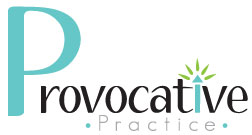To support its vision of student success, and forming its fourth Fundamental, Provocative Practice proposes a set of values-driven operational or design principles as well as a set of research-informed core programmatic principles distilled from the research on effective approaches for student high intellectual performance, school change and reform, and systems change. No single principle stands alone. They are inter-related, and to reach high levels of student success requires implementation of all these principles. These principles will serve as guidelines for Provocative Practice’s work with districts, schools, communities, and partner organizations.
Design Principles
Provocative Practice proposes a set of essential operational principles to define how we design and implement our priorities and initiatives, how we make decisions, and how we deal with negative patterns of thinking and doing that surface as barriers and obstacles. These are unique foundational principles that will be the pillars that guide our decisions and ensure our success.
Student-Centric Orientation
Every action we take is driven by our mission to serve students. At every level and in every instance, our decisions are based on the expectation that they will move us closer to our vision of student success.
Transparency
The stakeholders most impacted by decisions (including students and families) are involved from the beginning. We are ultimately accountable to them.
Alignment
Resource allocations (people, time, and money) reflect the goals and priorities of our work.
Service
The boundaries we set liberate rather than suffocate. Our decisions about our systems and structures make it easier rather than harder for people to get work done. Our procedures and protocols use the fewest and most-connected steps necessary to achieve their purpose.
Empowerment
We are empowered to use own best judgment. We are authorized to act independently in the best interests of our clients, as guided by our theory of action and our success map.
Risk-Taking
Learning requires taking risks. Mistakes are inevitable, but if we are focused and engaged, we can identify and avoid them in the future. As leaders, we are expected to show up and participate.
Big Picture
This transformational work is about systemic change and alignment, not incremental tweaking.
Continuous Improvement
We must be active learners even as we seek to educate. We will adjust our strategies and tactics as new data become available, constantly learning from our mistakes.
Core Programmatic Principles
Based on an extensive review of the professional literature and research, we also propose the following core principles as essential foundations for school reform that results in sustainable student success, as defined in our vision of student success.
Rich & Affirming Learning Environments
Create a safe, affirming, and enriched environment for participatory and inclusive learning for every group of students.
Empowering Pedagogy
Use culturally and linguistically responsive pedagogy that maximizes learning, actively accesses and develops student voice, and provides opportunities for leadership for every group of students.
Challenging & Relevant Curriculum
Engage every group of students in well-articulated and age-appropriate curriculum that purposefully builds a full range of language, literacy, and communication skills, including minimally, bilingualism, biliteracy, and multiculturalism. This curriculum is cognitively complex, coherent, relevant, and challenging, and by design, develops technological fluency and the critical/creative capacities in every student.
High Quality Instructional Resources
Provide and utilize a broad array of high quality standards-aligned instructional resources in the home language and in English that provide each group of students with equitable access to core curriculum and academic language in the classroom, school, and community.
Valid & Comprehensive Assessment
Build and implement valid and comprehensive assessment systems designed to promote reflective practice and data-informed planning in order students.
High Quality Professional Preparation & Support
Provide coherent, comprehensive, and ongoing professional preparation and support programs based on well-defined standards of practice for diverse learners. These programs are designed to create professional learning communities of administrators, teachers, and other staff to implement a powerful vision of excellent teaching for each group of students.
Powerful Family/Community Engagement
Implement strong family and community engagement programs that build leadership capacity and that value and draw upon community funds of knowledge to inform, support, and enhance teaching and learning for each specific group of students.
Advocacy-Oriented Administrative/Leadership Systems
Provide advocacy-oriented administration and leadership that institute system-wide mechanisms to focus all stakeholders on the diverse needs and assets of each specific group of students. These administrative and leadership systems structure, organize, coordinate, and integrate programs and services to respond systemically to the needs and strengths of each group of students.
